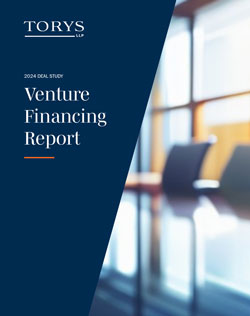


Authors

Torys’ Emerging Companies and VC Group
Last year’s decreased financing activity, depressed valuations, and investor-friendly deal terms had the 2023 Canadian VC market looking a lot like the previous year. To adapt, founders used their experience from 2022 to tailor their strategy, adopting a more conservative approach to their cash management and growth. Markets are continuing to recover in 2024, and investments in clean energy, AI, and healthcare will gain further momentum, as the demand for climate change mitigation technology, automated workflows, and better patient care increases.
Read our fourth annual study examining Canadian VC financings across 127 Canadian-headquartered startups.

With decreased financing activity, depressed valuations, and deal terms becoming more investor friendly, the 2023 Canadian venture capital market looked—and felt—a lot like the previous year. However, this time around, startups and VCs had the benefit of experience, having already navigated a year of uncertain market conditions.
2023 was a challenging capital raising year. Venture backed companies were forced to take a more conservative approach to their cash management and growth strategies, as global markets continued to adjust to higher interest rates, geopolitical tensions and the impact on financing opportunities and operations. Overall, the market for preferred share financings remained muted, with deal volume down approximately 14% year-over-year. Compared to 2021, deal volume was down 34%.
Despite an uncertain fundraising landscape, the appetite to finance later-stage companies (albeit with many at flat or down valuations) showed some resilience, with an uptick in the proportion of Series C and later-stage financings compared to 2022. Nonetheless, Seed and Series A segments once again accounted for the largest number of financings.
The state of play also impacted the terms on which companies were able to raise capital, with a more investor-friendly environment continuing to take shape. Investors negotiated for deal terms with greater downside protection to better insulate themselves from risk, including senior liquidation preferences. We continued to see financing rounds take the form of (i) recapitalizations at lower valuations with some form of pay to play or cram down, (ii) structured convertible instrument bridge financings and (iii) insider rounds containing investor-favourable terms. The goal of many of these financings was to keep startups afloat so that they could wait out the current environment and return to the market after improving their financial position, such as getting to profitability.
In 2022, certain founder-friendly deal terms—such as 1X liquidation preference, non-participating preferred shares, and broad-based anti-dilution rights—continued to hold the line. In 2023, although 1X liquidation preference remained the norm, investors were increasingly successful in negotiating for greater than a 1X liquidation preference.
Anecdotally, founders of early-stage ventures had a keen eye on business models, cash flow and path to profitability, in contrast to a growth-at-all-cost approach that dominated earlier cohorts. In a similar trend, founders of early-stage ventures deferred their Pre-Seed financings as they pushed to discover product market fit and held out for better terms in the hopes of a stronger market to come.
While Ontario and Québec remained leaders in venture capital investment, Alberta continued its strong growth trajectory and, if this upward trend continues, it may be on course to take Québec’s place as the second most active market for venture capital in Canada (on a deal count basis). The growth in the Alberta market is credited to a combination of the provincial government’s ongoing policies to stimulate venture activity, a community of successful tech leaders supporting emerging founders, and a strong talent base. That said, given the recent growth and nascency of the Alberta venture market, financings appear to be skewed to early-stage where investment amounts are lower compared to later-stage transactions. As such, Ontario and Québec, as incumbent market leaders, remain the strongest provinces for capital deployment and investment.
Overall, Canadian startups and venture investors continued to work collaboratively with a long-term view to building and supporting their businesses on mutually beneficial, balanced terms. Investors who were willing to write cheques (as opposed to non-participating existing investors) were able to dictate terms to sweeten their deal and preserve their liquidation priority at the expense of other investors not willing to do the same.
As the year progresses, the market will continue to stabilize, but remain at a slow pace. Investment in clean energy, artificial intelligence, and healthcare will gain further momentum, as the demand for climate change mitigation technology, automated workflows, and better patient care increases.
To discuss these issues, please contact the author(s).
This publication is a general discussion of certain legal and related developments and should not be relied upon as legal advice. If you require legal advice, we would be pleased to discuss the issues in this publication with you, in the context of your particular circumstances.
For permission to republish this or any other publication, contact Janelle Weed.
© 2025 by Torys LLP.
All rights reserved.